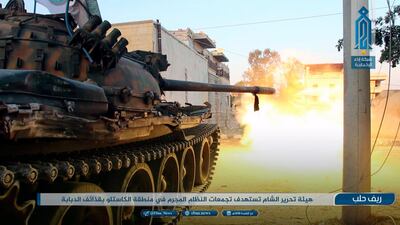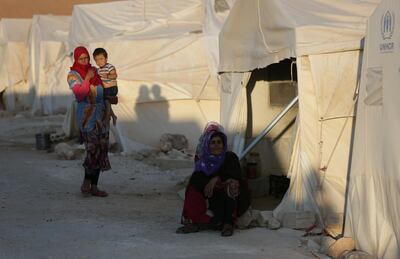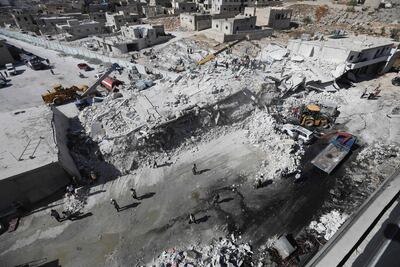The Syrian government has begun what is likely to be a slow and difficult march to regain control of the northern province of Idlib, the last remaining rebel-held area in the country.
The Syrian army has been amassing troops and heavy weaponry on the outskirts of the province. In recent days more than 50 civilians were killed in a heavy bombardment by Syrian and Russian jets in the area, according to the Syrian Observatory for Human Rights.
Idlib is the last holdout of the various rebel forces who tried to oust President Bashar Al Assad from power. After recapturing large swathes of territory over the past year, the president declared last month that “Idlib is our goal”.
On Thursday, helicopters dropped thousands of leaflets urging residents to reconcile with the government, saying the war “is close to an end”. The next day, the Syrian army shelled a number of positions on the edges of Idlib province, in the south, east and west.
The attack broke months of relative calm in the province, which is part of a “de-escalation zone” agreed between Turkey, Russia and Iran.
With an offensive looming, the fate of more than 2.5 million residents of Idlib is hangs in the balance. Over the past few years, the province has swelled with people fleeing from other parts of the country — more than half of its population is thought to be internally displaced.
Turkey has closed its border with Syria, meaning that civilians in the province will be trapped by any government attack.
“We have nowhere to escape to,” said Qusay Noor, a journalist in the town of Mara Al Nu'man, in southern Idlib. “It’s a really hard feeling to know that.”
Noor fled with his family to Idlib from Eastern Ghouta about four months ago, when the government recaptured the area following a long siege.
“I do not want to see this happening again in Idlib. I know the brutality of Bashar Al Assad and Russia. I have seen lot of the crimes of the regime, but here is our last place.”
The UN has warned of a “bloodbath” if the offensive goes ahead, and called for more talks to prevent it taking place.
But despite the Syrian government’s enthusiasm for the operation, it is unlikely that it will try to recapture the entirety of the province any time soon. Instead, it is focusing on strategic areas around the edges.
The first stages of the assault are expected to target Jisr-Ash-Shugur and the surrounding area in the west of Idlib, which borders the Alawite heartland of Latakia. Following that, the next priority for the government would likely be to secure the M5 highway between Hama and Aleppo.
As with previous assaults on rebel areas, the Syrian army may use a mixture of military pressure and locally agreed reconciliation agreements.
As part of the de-escalation agreement in Idlib, Turkey set up 12 observation posts around the edges of the province. It also has significant forces in “safe zones” along the border, most of which was captured from the US-backed Syrian Democratic Forces (SDF) and ISIS, in two separate offensives.
How Turkey will react to a serious move by the government to recapture Idlib remains to be seen. Turkish officials have declared Idlib a “red line”, and President Recep Tayyip Erdogan has lobbied Russia to prevent an attack.
Speaking on Sunday, Mr Erdogan said Turkey had finalised plans for more safe zones in Syria, and that military and diplomatic efforts had been accelerated to avoid a "catastrophe” in Idlib. Those efforts may slow down the government’s plans, according to analysts.
"To the extent that Turkey has the means to discourage an offensive, those means are mainly political, not military," Sam Heller, a senior analyst at Crisis Group, told The National.
“The main deterrent to action is Turkey's political entanglement with Russia and Iran, co-sponsors of the north-western de-escalation. Iran and, in particular, Russia have political efforts in which they've co-invested with Turkey and rely on Turkey's continued participation.
“And their relationships with Turkey are important for other reasons, whether that's pulling Turkey away from Nato for Russia, or resisting new US sanctions for Iran,” Mr Heller added.
Ankara has also been working behind the scenes to bolster allied Syrian rebels. In recent weeks, it has supported efforts by a number of rival groups to unite under a joint command in order to better counter a government attack.
But about 60 per cent of the province is controlled by Hayat Tahrir Al Sham (HTS), a coalition led by Al Qaeda's former Syria affiliate. The group has launched a wave of arrests in recent weeks against people suspected of seeking reconciliation with the government. Its influence in the area has been used as a justification for the Russian and Syrian attacks.
______________
Read more:
Idlib could be the endgame of the Syrian conflict
Syrian anti-air unit engage 'enemy target' as regime gears up for Idlib push
______________
One of the main topics of recent talks between Turkey, Russia and Iran was how Ankara might delay a government offensive by going after HTS themselves.
“The fact of the matter is that Turkey is the sheriff of Idlib. In the eyes of Russia and the United States, it is Turkey's responsibility to eliminate the threat from Al Qaeda and its ideological fellow travelers in Idlib,” said Nicholas Heras, Middle East Security Fellow at the Centre for a New American Security.
“The only alternative to Turkey in order to take out Al Qaeda in north-west Syria is Bashar Al Assad. If Turkey wants to avoid hundreds of thousands of Syrian refugees fleeing to the Turkish border from a conflict in Idlib launched by Assad, then Turkey needs to act decisively now to eliminate Al Qaeda,” he said.
Turkey did not respond to Russian and Syrian strikes on various parts of Idlib on Friday, but a number of trucks were seen heading towards its observation posts in southern Idlib on Saturday carrying concrete barriers, suggesting that it may be bolstering defences.
Even if Turkish diplomacy fails, the battle for Idlib will not be easy one for the government, according to Wissam Zarqa, an English teacher who was displaced from Aleppo to Idlib.
“People in these areas are not as tired as people were in Aleppo, Homs and Ghouta, where they were besieged for a long time. Here it’s different. That’s why if there is a battle, it won’t be a short one. It would be a long war.”
Meanwhile, an explosion in the north-west of Idlib killed at least 39 civilians on Sunday, according to the UK-based Observatory. The blast at a weapons depot in a residential area of Sarmada brought down two buildings. The cause was unknown.



